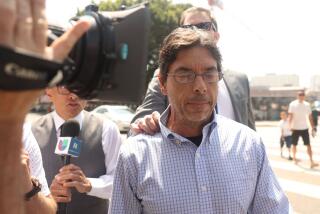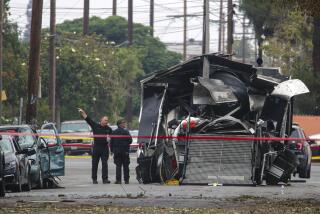‘Sleuth to the Stars’ Enters Guilty Pleas
- Share via
In a surprise turnabout midway through his trial, celebrity private investigator Anthony Pellicano pleaded guilty Thursday to illegally possessing C-4 plastic explosives and two modified hand grenades capable of being used as booby-trapped bombs.
Under terms of a plea agreement negotiated with prosecutors during the trial lunch break, Pellicano will face a 27- to 33-month prison term when he is sentenced Jan. 20.
Pellicano and his lawyers declined to talk with reporters as they left the courtroom of U.S. District Judge Dickran Tevrizian on the second day of the nonjury trial.
Though pleading guilty to the two felony charges, Pellicano retained the right to withdraw his plea if he prevails in an appeal challenging Tevrizian’s refusal to suppress evidence seized in an FBI search of his Sunset Boulevard office suite Nov. 21.
More than a dozen FBI agents descended on his office searching for evidence that might link him to a threat made against a Los Angeles Times reporter. The reporter, Anita Busch, was researching the relationship between actor Steven Seagal and a reputed Mafia figure.
Alexander Proctor, a convicted drug dealer, has been charged with leaving a dead fish and a rose on the hood of Busch’s car with a sign reading, “Stop.” During a secretly recorded conversation with an FBI informant, Proctor allegedly said that Pellicano paid him to carry out the threat on behalf of Seagal. Both Pellicano and Seagal have denied any involvement.
Although Pellicano has not been charged in the threat case, evidence seized during the search of his office resulted in his arrest on the explosives charges and set in motion a sweeping federal grand jury probe into allegations that he had been engaged in extensive illegal wiretapping on behalf of some prominent Los Angeles lawyers.
Pellicano, a onetime Chicago skip tracer who never finished high school, gained prominence during the 1980s when he helped auto executive John Z. DeLorean beat drug selling charges in Los Angeles. Pellicano dissected key government tapes and dug up damaging information that undermined prosecution witnesses.
Afterward, Pellicano built a successful and lucrative practice representing some of the biggest stars in Hollywood, including Elizabeth Taylor, Michael Jackson, Kevin Costner and Roseanne Arnold. But Pellicano also applied his skill as a forensic audio analyst to helping law enforcement agencies around the country.
In accepting Pellicano’s guilty pleas Thursday, Tevrizian noted that he is almost certain to lose his private investigator’s license as a result. Pellicano, standing at a lectern beside one of his defense lawyers, said quietly, “I understand.”
In fact, Pellicano has been out of business since earlier this year. He said his business dried up because of the notoriety surrounding his involvement in the multiple criminal investigations.
On Thursday, Pellicano seemed resigned to defeat. Although he is not scheduled to be sentenced until Jan. 20, he volunteered to surrender to the U.S. Bureau of Prisons on Nov. 17 to begin serving his sentence.
Until the afternoon lunch break, defense attorneys Donald Re, Victor Sherman and Alan Weil seemed determined to forge ahead and present their case to the judge. But the prosecution’s last key witness might have given them pause.
Kirk Yeager, an FBI bomb expert from Quantico, Va., offered damaging scientific evidence deflating most of the defense team’s claims.
Though the defense had contended in opening statements that the hand grenades were little more than pyrotechnic devices with no lethal potential, Yeager testified that they were packed with enough explosives and rigged in a way that made them deadly destructive devices, perfect for use in a booby trap.
“They were improvised explosive devices, homemade bombs,” said Yeager, who served on the FBI forensics team that investigated the terrorist bombing of the U.S. destroyer Cole.
At the time of his arrest last November, Pellicano told FBI agents he had acquired the hand grenades and C-4 explosives from an unnamed client, placed them in his safe and forgotten about them. He has never disclosed the client’s identity.
Pellicano was charged with possession of unregistered weapons (the grenades) and possession of plastic explosives that lacked chemical detection agents as required under federal law. As part of the plea agreement, Assistant U.S. Atty. Daniel Saunders agreed to drop a misdemeanor charge accusing Pellicano of unlawfully storing dangerous explosives.
More to Read
Sign up for Essential California
The most important California stories and recommendations in your inbox every morning.
You may occasionally receive promotional content from the Los Angeles Times.













